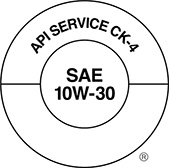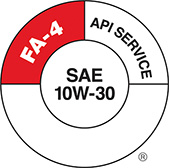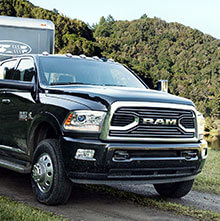API CK-4 and API FA-4 at a Glance

CK-4
- For current and older engines*
- Backward compatible with CJ-4, CI-4 with CI-4 PLUS, CI-4, and CH-4 oils
- Superior wear and oxidation protection compared with CJ-4 oils
- Improved shear stability
- Minimum HTHS viscosity, 3.5 cp
- Available in typical diesel viscosity grades SAE 15W-40, 10W-40, and 10W-30 (may even be offered in lighter viscosity grades)
- On-highway and non-road use

FA-4
- For newer designs of engines (late 2016 and beyond)*
- NOT backward compatible with API CK-4, CJ-4, CI-4 with CI-4 PLUS, CI-4, and CH-4 oils because of lower HTHS viscosity
- Same benefits as CK-4, plus potential to reduce emissions thanks to lower HTHS viscosity (2.9–3.2 cP)
- Available in SAE 10W-30, 5W-30, and 0W-30
- On-highway use; check with engine manufacturer regarding non-road use
* Check with engine manufacturer to verify use and any suggested maintenance changes.
Key Points
CK-4
Engine manufacturers are expected to recommend API CK-4 oils for on-highway and non-road diesel engines in use today.
CK-4 oils have improved oxidation resistance, shear stability, and aeration control compared with CJ-4 products. CK-4 oils are backward compatible with CJ-4, CI-4 with CI-4 PLUS, CI-4, and CH-4 oils, so engine manufacturers are expected to recommend CK-4 oils for on-highway diesel engines using CJ-4 and earlier categories. Still, you should check with the engine manufacturer before moving up to CK-4. Remember to ask about your oil change interval when using CK-4.
FA-4
Check with the manufacturer of your engine before using API FA-4 oils.
FA-4 oils are intended to provide the same benefits as CK-4 and, at the same time, accommodate the higher temperatures and oil pressures and other demands created by new designs and technologies of next-generation engines scheduled for release in late 2016 and beyond. Additionally, FA-4’s lower viscosity (2.9–3.2 cP vs 3.5 cP for CK-4) is expected to help the new diesel engines meet more stringent greenhouse gas emissions requirements.
However, FA-4’s lower viscosity comes with one condition: it’s NOT interchangeable with CK-4 or backward compatible with CJ-4, CI-4 with CI-4 PLUS, CI-4, and CH-4 oils. So it's important to check with the engine manufacturer regarding where FA-4 can be used.
Other FA-4 points to discuss with the engine manufacturer:
- Fuels with sulfur content greater than 15 ppm sulfur. FA-4 oil isn’t recommended for use with fuels having greater than 15 ppm sulfur.
- Use with older engines. In many cases, engine manufacturers will only recommend FA-4 for newer engines.
Maintenance Schedule
Maintenance schedules aren’t defined by the CK-4 and FA-4 standards. Contact your engine manufacturer or service provider to discuss if any change in maintenance is required.
Availability
CK-4 and FA-4 oils can be sold as of December 1, 2016. Check with your supplier or preferred manufacturer for availability.
Vetted in the Lab and in the Field
New tests and more stringent limits have been developed to ensure that CK-4 and FA-4 oils not only help engines meet 2017 emissions standards, but also provide improved engine protection.




